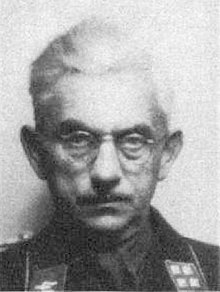Ernst Jenke
Ernst Jenke (born February 27, 1883 in Breslau ; † May 31, 1950 in Heilsbronn ) was a German politician ( NSDAP ).
Live and act
After attending elementary school , Jenke attended the non-commissioned preschool in Wohlau and the non-commissioned officer school in Ettlingen for four years . He then went through all ranks up to lieutenant in just under twenty years of service.
In the First World War , from which Jenke returned home as a war disabled, he was awarded the Iron Cross 1st Class. After the war he was trained in the police, municipal and postal services. In 1923 he became chief post secretary.
In the National Socialist German Workers' Party (NSDAP), Jenke was promoted to district leader shortly after joining the party. In 1928 Jenke ran for the Prussian state parliament without receiving a mandate.
In the election of September 1930 , Jenke was elected to the Reichstag for the first time , to which he then belonged for almost fourteen and a half years until the end of Nazi rule in May 1945. In March 1933, Jenke voted for the Enabling Act , which formed the legal basis for the establishment of the Nazi dictatorship.
Jenke was also a member of the Lower Silesian Provincial Parliament , regional chairman of the Lower Silesian NSDAP and regional advisor for questions relating to war casualties and the National Socialist self-defense (prisoners and wounded aid). After all, Jenke was also a member of the Sturmabteilung (SA), in which he achieved the rank of Obersturmbannführer.
literature
- Joachim Lilla , Martin Döring, Andreas Schulz: extras in uniform: the members of the Reichstag 1933–1945. A biographical manual. Including the Volkish and National Socialist members of the Reichstag from May 1924 . Droste, Düsseldorf 2004, ISBN 3-7700-5254-4 , p. 280 .
Web links
- Ernst Jenke in the database of members of the Reichstag
Individual evidence
- ↑ Life data according to Wilhelm Heinz Schröder : BIORAB-Online . According to Lilla, extras , p. 280, the place of death cannot be proven at the Heilbronn registry office.
- ^ SA membership according to Walter Gyßling : My life in Germany before and after 1933 , 2003, p. 432.
| personal data | |
|---|---|
| SURNAME | Jenke, Ernst |
| BRIEF DESCRIPTION | German politician (NSDAP), MdR |
| DATE OF BIRTH | February 27, 1883 |
| PLACE OF BIRTH | Wroclaw |
| DATE OF DEATH | May 31, 1950 |
| Place of death | Heilbronn (unsure) |
